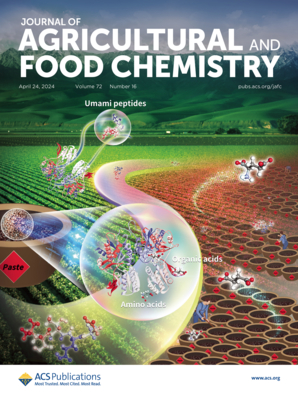藜麦皂苷中的熊去氧胆酸通过抑制TLR4/NF-κB通路调控结肠炎
IF 6.2
1区 农林科学
Q1 AGRICULTURE, MULTIDISCIPLINARY
引用次数: 0
摘要
肠道菌群及其代谢物的改变在炎症性肠病(IBD)的发展中起着关键作用。在此,我们研究了藜麦加工过程中的副产物皂苷调节IBD的机制。16S rRNA测序结果显示,SQ改善了葡聚糖硫酸钠(DSS)处理小鼠肠道菌群失调,提高了结肠抗氧化活性和屏障完整性。广谱抗生素进一步证明SQ的肠道保护作用是由肠道菌群介导的。其次,将sq诱导的肠道菌群/代谢物粪便菌群移植(FMT)接种dss处理的小鼠,可显著缓解结肠炎。非靶向代谢组学和脂质组学显示,在SQ补充后,熊去氧胆酸(UDCA)作为一种微生物代谢物被富集。UDCA通过靶向TLR4/NF-κB通路在体内减轻dss诱导的结肠炎,这在TLR4激动剂/拮抗剂处理的Caco-2细胞模型中也得到了验证。总之,我们的研究结果表明,肠道微生物- udca - tlr4 /NF-κB信号在介导SQ的保护作用中起关键作用。本文章由计算机程序翻译,如有差异,请以英文原文为准。

Gut-Derived Ursodeoxycholic Acid from Saponins of Quinoa Regulated Colitis via Inhibiting the TLR4/NF-κB Pathway
Alteration of the gut microbiota and its metabolites plays a key role in the development of inflammatory bowel disease (IBD). Here, we investigated the mechanism of saponins, a byproduct from quinoa (SQ) processing, in regulating IBD. SQ ameliorated gut microbiota dysbiosis revealed by 16S rRNA sequencing and improved colonic antioxidant activities and barrier integrity in dextran sulfate sodium (DSS)-treated mice. Broad-spectrum antibiotics further proved that the gut-protective effects of SQ were mediated by gut microbiota. Next, fecal microbiota transplantation (FMT) of SQ-induced gut microbiota/metabolites to inoculate DSS-treated mice alleviated colitis significantly. Untargeted metabolomics and lipidomics revealed that ursodeoxycholic acid (UDCA) was enriched as a microbial metabolite after SQ supplementation. UDCA was then found to attenuate DSS-induced colitis in vivo by targeting the TLR4/NF-κB pathway, which was also verified in a Caco-2 cell model treated with a TLR4 agonist/antagonist. Overall, our findings established that gut microbiota-UDCA-TLR4/NF-κB signaling plays a key role in mediating the protective effects of SQ.
求助全文
通过发布文献求助,成功后即可免费获取论文全文。
去求助
来源期刊
CiteScore
9.90
自引率
8.20%
发文量
1375
审稿时长
2.3 months
期刊介绍:
The Journal of Agricultural and Food Chemistry publishes high-quality, cutting edge original research representing complete studies and research advances dealing with the chemistry and biochemistry of agriculture and food. The Journal also encourages papers with chemistry and/or biochemistry as a major component combined with biological/sensory/nutritional/toxicological evaluation related to agriculture and/or food.

 求助内容:
求助内容: 应助结果提醒方式:
应助结果提醒方式:


